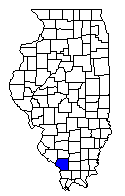
JUDGE FRANCIS MARION YOUNGBLOOD is one of the prominent citizens of Illinois, having in legal circles especially a wide acquaintance among the representative men of the state. He now resides in Carbondale. A native of Perry County, he was born March 15, 1835, and is a son of Isaiah I. and Electa (Jones) Youngblood. The family is of Welsh descent. The father was born in Georgia in 1795, was a farmer by occupation, and served in the War of 1812. In 1816, he removed to Illinois, becoming one of the pioneers of Franklin County, where he met and married Miss Jones, who was born in New York in 1800. She was a daughter of Philip Jones, an early settler of Franklin County. Shortly afterward they removed to Tennessee, but about 1828 made a permanent location in Perry County. The mother was well educated and taught her husband all he knew after their marriage. Mr. Youngblood then took a deep interest in education, built a schoolhouse upon his farm and did everything possible for the education of his children. He met with fair success in business, and at his death owned a good farm of two hundred acres. In politics he was a Democrat, and he and his wife were members of the Primitive Baptist Church, of which he was a minister for many years. His wife died January 7, 1842, and his death occurred August 1, 1850. They were the parents of ten children, eight now living: Mrs. Corinna Sturdevant, Mrs. Louisa H. Ford, Mrs. Lavina Hawkins, Mrs. Sarah A. Hawkins, Mrs. Rachel Robertson, William J., Edmund D. and Francis M.
The Judge conned his lessons in the old log school which his father built and which was taught by his sister. At the age of fifteen he began working on a farm for his brother, with whom he remained two years. He then begun speculating in stock, but losing his money, he turned his attention to the blacksmith's trade. He built the first shop in Tamaroa, and after carrying it on for two and a-half years, he spent two years as a student in a private school. Later he embarked in teaching.
Mr. Youngblood was married December 23, 1858, to N. E. Eaton, who was born on Paradise Prairie, November 17, 1840, and was a daughter of West Eaton, a native of Tennessee, and one of the early settlers of Perry Country, Ill. After his marriage, the Judge continued teaching for a time. In November, 1859, he was elected Assessor and Treasurer of Perry County, and filled the office for two years. In July, 1860, he began reading law with Judge William K. Parish, of DuQuoin, and in the summer of 1861 was admitted to the Bar. He immediately began practice in DuQuoin, where he continued until January, 1862, when lie removed to Benton, and there opened a law office, carrying on practice at that place for some time. From April, 1874, until July, 1875, he was numbered among the lawyers of Shawneetown, Ill., and then resumed practice in Benton, where he remained until his removal to Carbondale, in September, 1887.
Unto Mr. and Mrs. Youngblood were born seven children, five of whom are yet living: Ransom A., of Benton, who married Nannie Hubbard, by whom he has four children; Dougherty V., who is in partnership with his father; Joseph E., of Pinckneyville, who wedded Nannie Gouch, by whom he has one child; Louisa R. and Laura A. The mother of the family is a member of the Primitive Baptist Church, and is a most estimable lady.
The Judge belongs to the Masonic fraternity, and for nine years has been Master of Benton Lodge No. 64, A. F. & A. M. He also belongs to DuQuoin Chapter, R. A. M., and to the Knights of Honor. His hearty support and co-operation are given to the cause of education and to all enterprises calculated to prove of public benefit. He takes an active interest in politics, votes with the Democratic party, and frequently serves as a delegate to its conventions. He served as Prosecuting Attorney for the Twenty-sixth Judicial Circuit, which comprised Franklin, Williamson, Johnson, Saline, Gallatin and Hardin Counties. He was elected in November, 1868, and filled the office four years. In November, 1872, he was elected State Senator from the Forty-seventh District, comprising Franklin, "Williamson, Saline and Gallatin Counties. He served on the Railroad, Appropriation and Judiciary Committees. In the year 1880 he was elected to the State Legislature from the same district, and served on the same committees. His public and private life are alike above reproach, and while in the Assembly, his straightforward course, devoted to the interests of his constituents, won him high commendation. His success as a lawyer has been marked. His pleas are the admiration of all who hear him, and his arguments always tell with the jury. His prominence has been won through merit and not through influence or outside aid.
Extracted from Portrait and Biographical Record of Randolph, Jackson, Perry and Monroe Counties, Illinois, published in 1894, page 452.
Randolph |
Perry | Franklin |
Perry MO |
 |
Williamson |
| Union |


